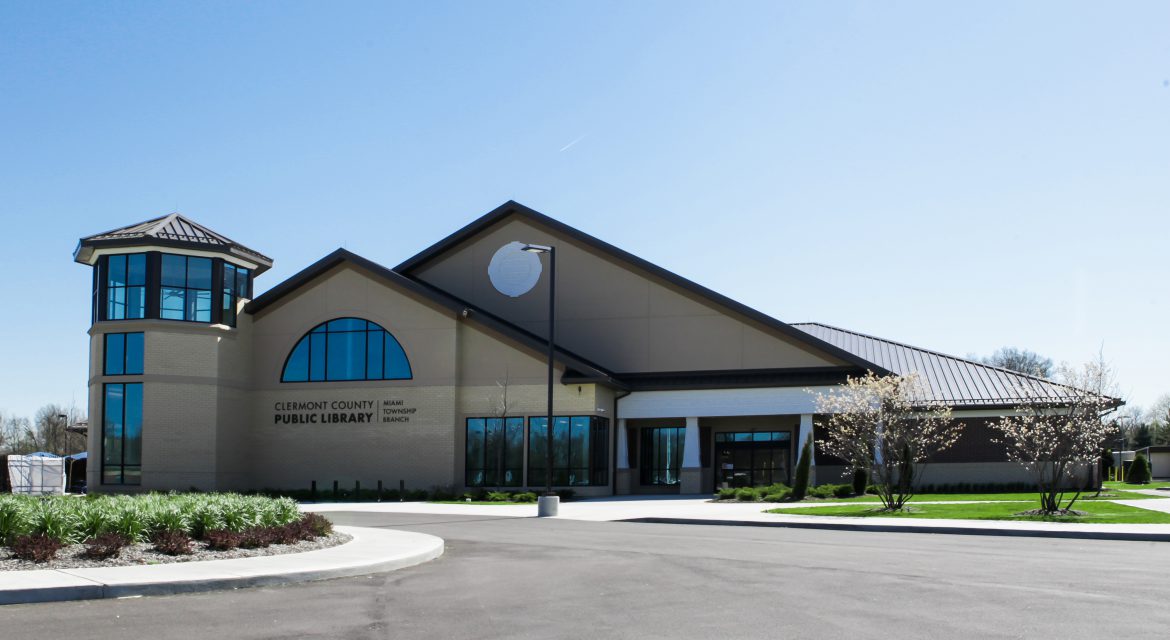
BATAVIA, OHIO (Nov. 21, 2024) – The Clermont County Common Pleas Court is looking a member of the community to fill a vacancy on the Clermont County Library Board of Trustees. The term of the appointment runs January 2025 through December 2031.
Requirements for Trustees
Preferred Experience
How to Apply
Deadline
About the Clermont County Public Library
With 10 branches throughout the county, the Clermont County Public Library is governed by a seven-member board of trustees appointed by the Board of Clermont County Commissioners and Judges of the Common Pleas Court. The board, in turn, hires the library director who implements policies and monitors operations.
BATAVIA, OH — The Clermont County Common Pleas Court will be appointing a member to the Clermont County Law Library Resources Board to fill a recent vacancy on a current 5-year appointment that will expire on Dec. 31, 2022.
Applicants must be a resident of Clermont County and an attorney licensed to practice law in the state and in good standing before the Supreme Court of Ohio.
Interested residents should submit a letter of interest and a brief resume to the Court Administrator at the Clermont County Common Pleas Court, 270 East Main Street, Batavia, OH 45103 by July 21, 2021.

BATAVIA, OH — To handle a rapidly expanding caseload caused primarily by the drug crisis, the Clermont County Common Pleas Court Adult Probation Department has added both space and staff.
On Oct. 23, the Board of County Commissioners authorized the lease of additional office space at 322 E. Main St. in Batavia. Meantime, the department has hired four employees this year to bring its size to 34. Another may be hired next year.
Clermont County saw a 48-percent increase in felony indictments between 2017 and 2018, largely due to drug law violations and other offenses driven by drug addiction. More than half of the cases on probation supervision are from drug law violations. Factor in thefts and other types of property offenses for those stealing to support a habit, and the percentage goes even higher.
“It takes six to 12 months for indictments to catch up to the Probation Department,” said Director Julie Frey, who starts her 30th year with the department in January. “That’s why we’re so desperate for new people and office space. I don’t think people realize the chain of events and how this impacts every part of the criminal justice system.”
The Department’s Justice Reinvestment & Incentive Grant money helped pay for the additional employees. The Department also receives grant funds to help offset employees’ salaries through the Community Corrections Act. Both of the grants, which operate on 2-year cycles, were renewed in July.
Prison overcrowding and research findings that show probation works better and more cost-effectively than incarceration at rehabilitating low-risk felons have contributed to more people being served by the Probation Department.
“The grants are key to keeping up with demand,” Frey said. “I fear demand will continue to increase, and our staff has been working lots of overtime to keep up.”
Judges set conditions, and Probation ensures they’re met. If not, they bring it to the judges’ attention.
The monthly average of pre-trial defendants under the department’s supervision has increased 33 percent to 139 people, said Deputy Director Mary Brock, who also started her career in probation 29 years ago.
If a person enters a guilty plea or is found guilty, Probation conducts a pre-sentence investigation. Clermont County’s Pre-Sentence Investigation Unit has increased from three to five people, and still is overloaded. In 2018, the Department averaged 68 pre-sentence reports a month. The Department has been investigating and preparing 83 per month this year.
Convicted felons usually report to a probation officer in the Supervision Unit a couple of times a month at first. They may earn less-frequent visits as times goes on. For the most part, people on probation stay on “community control” for three-to-five years.
In 2019, the department has served 1,372 people each month – up from 1,174 during the same period last year.
Probation uses the Ohio Risk Assessment System, which was developed at the University of Cincinnati and is used statewide.
Supervision Unit employees have a minimum of a Bachelor’s Degree in Criminal Justice or a related field. Many have Master’s Degrees. The department’s Community Corrections ACT Grant Program oversees all intensive supervision. The Intensive Supervision Unit provides intensive supervision for a clientele given a last chance to make it in the community, or go to prison. It also includes an employment specialist, who has had success at finding people jobs, some with benefits. The program helps ensure that offenders pay child support and avoid prison. Last year, the program helped pull in $365,494 from offenders convicted of criminal non-support.
Some get medication-assisted treatment for opiates. The number of referrals for the treatment continues to grow by 29 per month.
“We have had some good success, especially with the low-risk population,” Frey said. “They’re able to get things together better than most folks.”
BATAVIA, Ohio (April 19, 2019) — Ohio Supreme Court Justice Judi French will meet with Clermont County Common Pleas judges on Thursday, April 25, to deliver grant checks from the Supreme Court’s Ohio Courts Technology Grant Fund.
Justice French will present two technology and security grant checks: $40,000 to upgrade video surveillance, and $14,608 for courtroom audio/visual equipment replacement.
When: 2 p.m. Thursday, April 25
Where: Clermont County Common Pleas Court, Judge Richard Ferenc’s courtroom, 2nd floor, 270 E. Main Street, Batavia, Ohio 45103
About Justice French:
Justice French was elected to her first full six-year term in 2014, after being appointed by Gov. John Kasich to fill a vacancy.
Justice French has spent the last two decades in public service. She has served as an appellate judge, chief legal counsel to the governor, an assistant attorney general, and a state government lawyer. Her legal experience also includes working as a corporate attorney and in private practice.
The daughter of a schoolteacher, Justice French appreciates her Ohio roots and education, and she is committed to being a part of civic education in Ohio. She speaks frequently to high school students, particularly those studying the Ohio judicial system. She serves as a mentor in a local program supporting students in foster care who want to go to college.
Justice French served on the court’s Access to Justice Task Force and continues to be an advocate for granting all Ohioans access to the civil justice system. Working with legal aid organizations around the state, she encourages lawyers to engage in pro bono activity.
She received three degrees from the Ohio State University: a bachelor’s in political science, a master’s in history and, with honors, her law degree. In 2018, the OSU Moritz College of Law awarded her the Distinguished Jurist Award for her work on the bench. ####
BATAVIA, Ohio (Jan. 15, 2019) – Clermont Common Pleas Judge Jerry McBride has been elected as the administrative judge of the General Division of the Clermont County Common Pleas Court for 2019. The administrative judge has full responsibility and control over the administration, docket, and calendar of the court.
Judge McBride is responsible to the chief justice of the Supreme Court of Ohio in the discharge of the administrative judge’s duties, for the court’s adherence to the Ohio Rules of Superintendence, and for the termination of all cases in the court without undue delay. Judge McBride was first elected to Common Pleas Court in 1994.
Common Pleas Judge Anthony Brock has been elected presiding judge for 2019, by judges from all divisions of the Clermont County Common Pleas Court system. As presiding judge, Brock conducts an annual judicial meeting and other meetings as needed to discuss and resolve administrative issues common to all divisions of the court. He may also assign judges, on a temporary basis, to serve in another division of the court if required.
Judge Brock also has the authority to appoint members to the Public Defenders Commission, Veterans’ Service Commission, the Law Library Resource Board, the Clermont Metropolitan Housing Authority Board, and the Facility Governing Board for the Multi-County Community Correctional Center. Judge Brock was first elected to Clermont County Common Pleas Court in 2017.
#######
BATAVIA, Ohio – The Clermont County Opiate Task Force voted to oppose Issue 1 at its meeting on Oct. 11.
The task force is comprised of stakeholders representing county government, agencies and the courts (Commissioners, Clermont County Public Health, Clermont County Mental Health & Recovery Board (MHRB), Municipal Court Probation, Common Pleas Court Probation, Public Defender, Children’s Protective Services, County Sheriff); Greater Cincinnati Behavioral Health Services; Clermont Mercy Hospital; law enforcement and fire/EMS departments; faith-based organizations and private citizens.
The Opiate Task Force’s statement declared: “The Clermont County Opiate Task Force (OTF) firmly believes that individuals with a substance use disorder benefit from treatment, and that recovery is possible. The OTF opposes this constitutional amendment because it does not address the problem as intended. Issue 1 polarizes the relationship between treatment and criminal justice, when in fact criminal justice and treatment work hand in hand to assist individuals with reaching recovery. Issue 1 will hinder the ability of the criminal justice system to work to assure that individuals who need treatment will receive it and maintain it. Along with the Clermont County Commissioners, our criminal justice partners, including the Clermont County Police Chief’s and Sheriff’s Association, and the Ohio Association of County Behavioral Health Authorities, the OTF implores the Ohio General Assembly to immediately bring together a bipartisan coalition of concerned Ohioans to take action to address the issue of increased treatment services for offenders through a legislative solution, not a constitutional amendment. The OTF strongly encourages all community members to become well informed about Issue 1.”
At the meeting, a panel including Common Pleas Judge Jerry McBride, Assistant Prosecutor Darren Miller, Sheriff Steve Leahy, Commissioners Ed Humphrey and David Painter, and Karen Scherra, Executive Director of MHRB, spoke out against Issue 1 and detailed the impact it would have on the county courts, law enforcement and the County Jail, and taxpayers.
Common Pleas Judge Jerry McBride noted that both Municipal and Common Pleas Court judges work with lesser offenders to get them into treatment instead of jail or prison. “The reality is that less and less F4s and F5s (felony offenders) go to prison every day,” he said. “For years now, the emphasis in drug possession has been on treatment.”
Karen Scherra of the Mental Health & Recovery Board said that although her board is in favor of legislative reforms, it opposes Issue 1. “We do not see treatment increasing under Issue 1,” she said. “It’s often the stick of criminal justice that gets people into treatment.” She noted that her board has worked closely with county partners in criminal justice as well as the Commissioners to come up with initiatives in the battle against the opioid problems in the county. “If this passes we will watch a system that we worked really hard to build up collapse,” she said.
On Oct.3, the Clermont County Commissioners passed a resolution opposing Issue 1.
(This article was revised on Oct. 30, 2018.)
########
BATAVIA, Ohio (Dec. 8, 2017) — Clermont Common Pleas Court Judge Richard Ferenc has been elected as the administrative judge of the General Division of the Clermont County Common Pleas Court for 2018.
The administrative judge has full responsibility and control over the administration, docket, and calendar of the court. Judge Ferenc is responsible to the Chief Justice of the Supreme Court of Ohio in the discharge of the administrative judge’s duties, for the court’s adherence to the Ohio Rules of Superintendence, and for the termination of all cases in the court without undue delay.
Judge Ferenc was first elected to Clermont County Common Pleas Court in 2010.
Common Pleas Court Judge Jerry McBride has been elected presiding judge for 2018, by judges from all divisions of the Clermont County Common Pleas Court system. As presiding judge, Judge McBride conducts an annual judicial meeting, and other meetings, if necessary, to discuss and resolve administrative issues common to all divisions of the court. He may also assign judges, on a temporary basis, to serve in another division of the court if required.
Judge McBride also has the authority to appoint members to the Public Defenders Commission, Veterans Service Commission, the Law Library Resource Board, the Clermont Metropolitan Housing Authority Board, and the Facility Governing Board for the Multi-County Community Correctional Center.
Judge McBride was first elected to Clermont County Common Pleas Court in 1994.
#########
BATAVIA, Ohio (Nov. 22, 2017) — The Clermont County Common Pleas Court is looking for a member of the community to fill a vacancy on the Clermont County Library Board of Trustees. The term of the appointment runs from January 2018 through December 2024.
Trustees must be registered voters in Clermont County, will serve without compensation, and must be able to attend meetings held at 6 p.m. on the second Monday of each month at the Union Township Library. Those interested should submit a brief resume and a letter stating their interest in becoming a library trustee. Send the resume and letter to Clermont County Common Pleas Court, c/o Court Administrator, 270 East Main Street, Batavia, Ohio 45103. Applications for the position are due by Dec. 6.
With 10 branches throughout the county, the Clermont County Public Library is governed by a seven-member board of trustees appointed by the Board of Clermont County Commissioners and judges of the Common Pleas Court. The board, in turn, hires the library director who implements policies and monitors operations.
#########

BATAVIA, Ohio (Aug. 10, 2017) — The new website of the Clermont County Common Pleas Court was recognized as a Top Ten Court Technology Solution by the National Association for Court Management at the NACM’s annual conference in July. The site can be viewed at www.clermontcommonpleas.com.
 The NACM awards are presented annually “to recognize courts that make the best use of technology to improve court services and access to the public.” Websites and other court technology projects are judged for their interactive capabilities (e-pay, e-filing, subscriptions, smart forms, etc.); access to public records and other helpful information; user interface (layout, navigation, ease of use, etc.); optimization for mobile services, accessibility, and the “cool” factor.
The NACM awards are presented annually “to recognize courts that make the best use of technology to improve court services and access to the public.” Websites and other court technology projects are judged for their interactive capabilities (e-pay, e-filing, subscriptions, smart forms, etc.); access to public records and other helpful information; user interface (layout, navigation, ease of use, etc.); optimization for mobile services, accessibility, and the “cool” factor.
Clermont County was in rare company: Other jurisdictions that were honored included the Arizona Administrative Office of the Courts; Dubai Commercial Court in UAE; Superior Court of Orange County, California; and the Ministry of Justice in Rwanda.
Senior Magistrate Harold Paddock and webmaster Robert Frost collaborated on the design and content, as the county migrated its website pages to WordPress, a popular blogging and web design software.
The Common Pleas website has easy-to-find information, such as weekly dockets and grand jury reports. “One of our primary goals from both the legal and the software side of the design process was to make most information available with two or at most three clicks from the home page. We think we’ve achieved that,” Mr. Paddock said.
Stephanie Hess, deputy administrative director of the Ohio Supreme Court, accepted the award on behalf of Clermont County at the NACM’s international convention in Washington, D.C. A complete list of award winners is available on the NACM website at https://www.nacmnet.org/sites/default/files/Top_10_Tech_Awards-Press_Release.pdf.
The National Association for Court Management, housed in Williamsburg, Virginia, at the National Center for State Courts, is a membership organization formed in 1985 to help court managers improve their proficiency while working with colleagues to improve the administration of justice. With more than 1,700 members in the United States and several countries, NACM is the largest organization of court management professionals in the world.
######